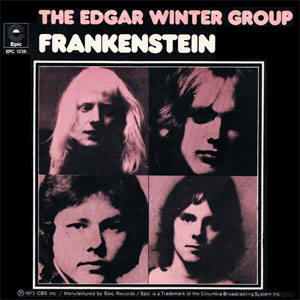
"Frankenstein" is an instrumental track by the American rock band Edgar Winter Group that was featured in the 1972 album They Only Come Out at Night and additionally released as a single.

Flaming Pie is the tenth solo studio album by English musician Paul McCartney, released on 5 May 1997 by Parlophone in the UK and Capitol Records in the US. His first studio album in over four years, it was mostly recorded after McCartney's involvement in the highly successful Beatles Anthology project. The album was recorded in several locations over two years, between 1995 and 1997, featuring two songs dating from 1992.
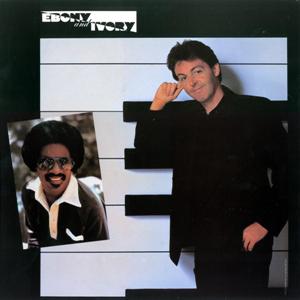
"Ebony and Ivory" is a song that was released in 1982 as a single by Paul McCartney featuring Stevie Wonder. It was issued on 29 March that year as the lead single from McCartney's third solo album, Tug of War (1982). Written by McCartney, the song aligns the black and white keys of a piano keyboard with the theme of racial harmony. The single reached number one on both the UK and the US charts and was among the top-selling singles of 1982 in the US. During the apartheid era, the South African Broadcasting Corporation banned the song after Wonder dedicated his 1984 Academy Award for Best Original Song to Nelson Mandela.

"Over My Head" is a soft rock song recorded by British-American rock band Fleetwood Mac for their self-titled 1975 album. The song was written by keyboardist and vocalist Christine McVie. "Over My Head" was the band's first single to reach the Billboard Hot 100 since "Oh Well", ending a six-year dry spell on the American charts.
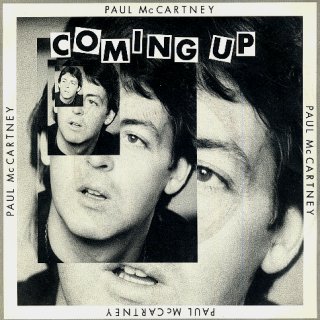
"Coming Up" is a song written and performed by the English rock musician Paul McCartney, released as the opening track on his second solo studio album McCartney II (1980). Like other songs on the album, the song has a synthesised sound, featuring sped-up vocals created by using a vari-speed tape machine. McCartney played all instruments.

"Live and Let Die" is the theme song of the 1973 James Bond film of the same name, performed by the British–American rock band Wings. Written by English musician Paul McCartney and his wife Linda McCartney, it reunited McCartney with former Beatles producer George Martin, who produced the song and arranged the orchestra. McCartney was contacted to write the song by the film's producers Harry Saltzman and Albert R. Broccoli before the screenplay was finished. Wings recorded "Live and Let Die" during the sessions for Red Rose Speedway in October 1972 at AIR Studios. It was also the first rock song to open a Bond film. Another version by B. J. Arnau also appears in the film.
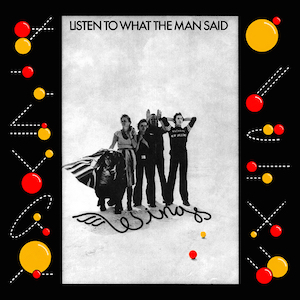
"Listen to What the Man Said" is a hit single from Wings' 1975 album Venus and Mars. The song featured new member Joe English on drums, with guest musicians Dave Mason on guitar and Tom Scott on soprano saxophone. It was a number 1 single on the Billboard Hot 100 in the US the week of July 19, 1975 and reached number 1 in Canada on the RPM National Top Singles Chart. It also reached number 6 in the UK, and reached the top ten in Norway and New Zealand and the top twenty in the Netherlands. The single was certified Gold by the Recording Industry Association of America for sales of over one million copies.
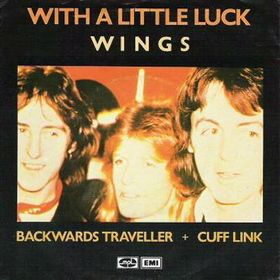
"With a Little Luck" is a single by the band Wings from their 1978 album London Town.
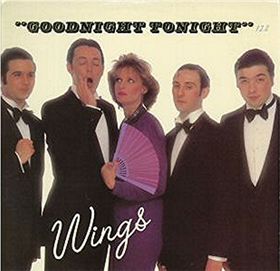
"Goodnight Tonight" is a song by the British–American rock band Wings. Written and produced by Paul McCartney, it was released as a non-album single on 23 March 1979 by Parlophone in the UK and Columbia Records in the US. It was recorded during the sessions for the band's 1979 album Back to the Egg and is notable for its disco-inflected sound and spirited flamenco guitar break.

"Getting Closer" is a rock song from the British rock band Wings, Paul McCartney's post-Beatles band. The song was released on the album Back to the Egg.

"No Matter What" is a song originally recorded by Badfinger for their album No Dice in 1970, written and sung by Pete Ham and produced by Mal Evans.
Oobu Joobu was a radio show created, directed and presented by Paul McCartney. It was described by McCartney as "wide-screen radio", and consisted of McCartney hosting a mix of various demos, live tracks, outtakes, rehearsals, and other unreleased material from his solo career, plus tracks by other artists that served as inspiration for McCartney, all wrapped around behind-the-scenes stories and 'chat'. The program aired in 1995 on the American radio network Westwood One, running for 15 episodes broadcast between May and September. The show's name was inspired by a BBC production of Alfred Jarry's Ubu Cocu.
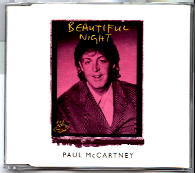
"Beautiful Night" is a song by Paul McCartney and is the 13th track on his 1997 album Flaming Pie. In December 1997, it was released as the third and final single from that album, peaking at number 25 in the UK Singles Chart. The single featured "Love Come Tumbling Down" and "Same Love" as b-sides both of which were previously unreleased tracks and were recorded in 1987 and 1988 respectively.
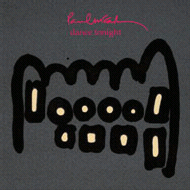
"Dance Tonight" is a song by Paul McCartney, the opening track to his 2007 album Memory Almost Full. The song was released as a download single in the United Kingdom on 18 June 2007, McCartney's 65th birthday. A week later, the song debuted at number 34 in the UK Singles Chart. The UK single was also issued as a picture disc that came in a plastic sleeve with a cardboard insert. On 1 July, the song peaked at number 26 on the UK Singles Chart. In the United States, it was released as the second single from the album, debuting and peaking at number 69 on the Billboard Hot 100. It marked McCartney's final appearance in the Hot 100 until 2015. The song was also nominated for Best Male Pop Vocal Performance at the 2008 Grammy Awards.

"Young Boy" is a song by English musician Paul McCartney, included as the fifth track on his 10th solo studio album, Flaming Pie (1997). McCartney reportedly started working on the song in August 1994. The initial tracks were recorded in February 1995 at Steve Miller's studio in Sun Valley, Idaho, and were completed in May at McCartney's home studio. This song and "The World Tonight" were featured in the 1997 movie Fathers' Day.

"Hope of Deliverance" is a song by English singer-songwriter Paul McCartney, released in December 1992 by Parlophone as the lead single from his ninth solo studio album, Off the Ground (1993). The rock and Latin song was written by McCartney and produced by him with Julian Mendelsohn. It reached number 18 on the UK Singles Chart and became a top-five hit in Austria, Canada, Germany, Italy, Norway, and Switzerland. The accompanying music video was directed by Andy Morahan. The song was recorded during sessions for Off the Ground, which took place on 17 July 1992. The overdub session is described in detail by Italian percussionist Maurizio Ravalico in the book Paul McCartney: Recording Sessions (1969–2013).

"Don't Ask Me Why" is a 1980 song by Billy Joel released as the third single from the album Glass Houses. The song spent two weeks at number one on the Adult Contemporary chart and peaked at number 19 on the Billboard Hot 100.

"Never My Love" is a pop standard written by American siblings Don and Dick Addrisi, and best known from a hit 1967 recording by the Association. The Addrisi Brothers had two Top 40 hits as recording artists, but their biggest success as songwriters was "Never My Love". Recorded by dozens of notable artists in the decades since, in 1999 the music publishing rights organization Broadcast Music, Inc. (BMI) announced it was the second most-played song on radio and television of the 20th century in the U.S.
Paul McCartney: In the World Tonight is a 1997 documentary about the making of Paul McCartney's Flaming Pie album. The film takes its name from the album's second track, "The World Tonight".
Return to Pepperland is the name given to an unfinished recording project by English musician Paul McCartney with American record producer Phil Ramone. The songs recorded during these sessions have been the basis of bootleg albums usually titled Return to Pepperland.

















